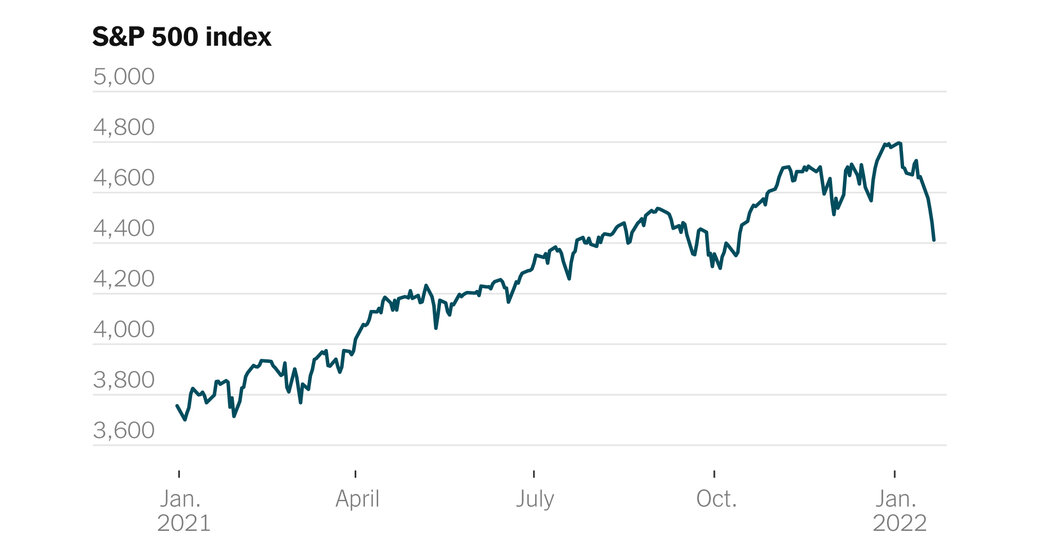
After falling for a fourth day in a row on Friday, the stock market suffered its worst week in nearly two years, and so far in January the S&P 500 is off to its worst start since 2016. Technology stocks have been hit especially hard, with the Nasdaq Composite Index dropping more than 10 percent from its most recent high, which qualifies as a correction in Wall Street talk.
That’s not all. The bond market is also in disarray, with rates rising sharply and bond prices, which move in the opposite direction, falling. Inflation is red hot, and supply chain disruptions continue.
Until now, the markets looked past such issues during the pandemic, which brought big increases in the value of all kinds of assets.
Yet a crucial factor has changed, which gives some market watchers reason to worry that the recent decline may be consequential. That element is the Federal Reserve.
As the worst economic ravages of the pandemic appear to be waning, at least for now, the Fed is ushering in a return to higher interest rates. It is also beginning to withdraw some of the other forms of support that have kept stocks flying since it intervened to save desperately wounded financial markets back in early 2020.
This could be a good thing if it beats back inflation without derailing the economic recovery. But removing this support also inevitably cools the markets as investors move money around, searching for assets that perform better when interest rates are high.
“The Fed’s policies basically got the current bull market started,” said Edward Yardeni, an independent Wall Street economist. “I don’t think they are going to end it all now, but the environment is changing and the Fed is responsible for a lot of this.”
The central bank is tightening monetary policy partly because it has worked. It helped stimulate economic growth by holding short-term interest rates near zero and pumping trillions of dollars into the economy.
This flood of easy money also contributed to the rapid rise in prices of commodities, like food and energy, and financial assets, like stocks, bonds, homes and even cryptocurrency.
What happens next comes from an established playbook. As William McChesney Martin, a former Fed chairman, said in 1955, the central bank finds itself acting as the adult in the room, “who has ordered the punch bowl removed just when the party was really warming up.”
The mood of the markets shifted on Jan. 5, Mr. Yardeni said, when Fed officials released the minutes of their December policymaking meeting, revealing that they were on the verge of embracing a much tighter monetary policy. A week later, new data showed inflation climbing to its highest level in 40 years.
Putting the two together, it seemed, the Fed would have no choice but to react to curb rapidly rising prices. Stocks began a disorderly decline.
Financial markets now expect the Fed to raise its key interest rate at least three times this year and to start to shrink its balance sheet as soon as this spring. It has reduced the level of its bond buying already. Fed policymakers will meet next week to decide on their next steps, and market strategists will be watching.
Low interest rates made certain sectors especially appealing, foremost among them tech stocks. The S&P 500 information technology sector, which includes Apple and Microsoft, has risen 54 percent on an annualized basis since the market’s pandemic-induced trough in March 2020. One reason for this is that low interest rates amplify the value of the expected future returns of growth-oriented companies like these. If rates rise, this calculus can change abruptly.
Inflation F.A.Q.
What is inflation? Inflation is a loss of purchasing power over time, meaning your dollar will not go as far tomorrow as it did today. It is typically expressed as the annual change in prices for everyday goods and services such as food, furniture, apparel, transportation costs and toys.
The very prospect of higher interest rates has made technology the worst-performing sector in the S&P 500 this year. Since its peak in late December, it has fallen more than 11 percent.
The S&P’s three best-performing sectors in the early days of 2022, on the other hand, are energy, financial services and consumer staples.
The energy index is dominated by fossil fuel companies, like Exxon Mobil and Halliburton, whose fortunes have risen along with oil and gas prices. Financial companies can charge more for loans when interest rates are high. Big banks like Wells Fargo have reported bumper earnings over the past week. Consumer companies like Kraft Heinz and Campbell Soup lagged the explosive share price growth of tech stocks earlier in the pandemic, but they have been gaining ground in this new environment.
The stock market, overall, has also lost some of its buoyancy for reasons other than monetary policy. “Stay at home” stocks that flourished during pandemic restrictions, like Netflix and Peloton, have begun to flag as people venture out more.
Some astute market analysts foresee bigger problems. Jeremy Grantham, one of the founders of GMO, an asset manager, predicts a catastrophic end to what he calls a “superbubble.”
But the current losses could be beneficial if they let a little air out of a potential bubble, without bursting investor portfolios. This year’s declines erase only a small share of the market’s gains in recent years: The S&P 500 rose nearly 27 percent last year, more than 16 percent in 2020 and nearly 29 percent in 2019.
And the prospects for corporate earnings remain good. Once the Fed starts to act, and the effects are better understood, the stock market party could continue — at a less giddy pace.




